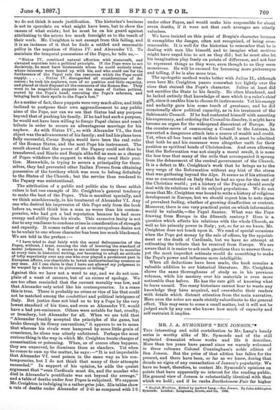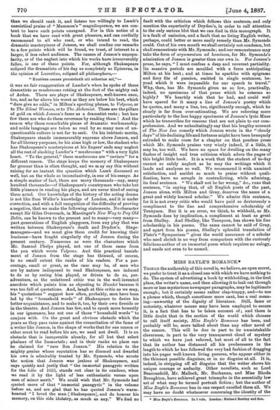MR. J. A. SYMONDS'S "BEN JONSON."•
Tins interesting and solid contribution to Mr. Lang's handy series is worthy alike of Mr. Symonds and of the still neglected dramatist whose works and life it describes. More than ten years have passed since we warmly welcomed in these columns Colonel Cunningham's noble edition of Ben Jonson. But the price of that edition has fallen for the present, and there have been, so far as we know, during that decade no signs of any resuscitation of Jonson's popularity. We have no heart, therefore, to contest Mr. Symonds's opinions on points that have apparently no interest for the reading public. His general view of Jonson is substantially identical with that which we hold ; and if he ranks Bartholomew Fair far higher • Englieli Worthies. Edited by Andrew Lang—Bat Joss. By John Addington Bymends. London Longo:tank, Green. sad Co. leas. than we should rank it, and listens too willingly to Lamb's casuistical praise of " Mammon's " magniloquence, we are con- tent to leave such points unargued. For in this notice of a book that we have read with great pleasure, and can cordially recommend to all who read, or who intend to read, the dramatic masterpieces of Jonson, we shall confine our remarks to a few points which will be found, we trust, of interest to a larger, if less select audience. The causes of Jonson's unpopu- larity, or of the neglect into which his works have irrecoverably fallen, is one of these points. For, although Shakespeare eclipsed the dramatists of his day as completely as Epicurus, in the opinion of Lucretius, eclipsed all philosophers,-
" Exoriens omnes prestrinxit nil anherias sol,"—
it was no fair exaggeration of Landor's when he spoke of these dramatists as mushrooms rotting at the foot of the mighty oak of Arden. There are plays of Shakespeare, well-known ones, too, and as far above his worst as they are below his best, which 4' dare give no odds," in Milton's sporting phrase, to Yolpone, or to The Silent Woman, or to The Alchemist. These are the pillars of gold on which Jonson's fame as a dramatist nets ; but how few there are who do them reverence by reading them ! And the reason why these remarkable pieces of dramatic workmanship and noble language are taken as read by so many men of un- questionable culture is not far to seek. On his intrinsic merits, Shakespeare stands immeasurably supreme above Jonson, and for all literary purposes, be his aims high or low, the student who has Shakespeare's masterpieces at his fingers' ends may neglect all the rest of slashing Landor's " mushrooms " with a very light heart. " To the general," these mushrooms are " caviare" for a different reason. The stage keeps the memory of Shakespeare far greener than is often thought, and we m ay say this without raising for an instant the question which Lamb discussed so well, but on the whole so inconclusively, in one of his essays. As a simple matter of fact, there are many thousands—nay, many hundred thousands—of Shakespeare's countrymen who take but little pleasure in reading his plays, and are never tired of seeing them acted. Our knowledge of the history of the acting drama is not like Sam Weller's knowledge of London, and it is under correction, and with a full recognition of the difficulty of proving a negative, that we make the following statements. No character except Sir Giles Overreach, in Massinger's New Way to Pay Old Debts, can be known to the present and to many—very many— past generations of English playgoers, from any play that was written between Shakespeare's death and Dryden's. Stage- managers—and we must give them credit for knowing their business—have fought singularly shy of Jenson during the present century. Numerous as were the characters which Mr. Samuel Phelps played, not one of them came from the pen which wrote Volpone. And this practical banish- ment of Jonson from the stage has thinned, of course, to no small extent the ranks of his readers. For a per- centage, small or great, as the case may be, of men who are by nature indisposed to read Shakespeare, are induced to do so by seeing him played, or driven to do so, per- adventure, ae the unlettered critic was in the well.invented anecdote which paints him as objecting to Hamlet because it was too fall of quotations. And, laugh at this critic as we may, his "quotations " suggest how often, probably, men have been led by the "household words" of Shakespeare to desire his better acquaintance, and to make it too, by their own fireside or in the theatre. And Jenson has few, and to speak more honestly in our ignorance, has not one of those "household words" to conjure with. On the great and obvious obstacle which the years as they pass raise against the resuscitation of the fame of a writer like Jonson, in the shape of works that for one reason or other must be read before his are, we need not dwell. It is an obstacle that is insuperable already, for all but that select phalanx of the Immortals ; and in their ranks no place can be claimed for "rare Ben Jonson." His relation to the mighty genius whose reputation has so dimmed and dwarfed his own is admirably treated by Mr. Symonds, who scouts the notion that Jonson was jealous of Shakespeare, and says quietly and justly that " the immortal panegyric written for the folio of 1623, stands out clear in its candour, when we read it by the light of less enthusiastic verses upon men of minor merit." We could wish that Mr. Symonds had quoted more of that " immortal panegyric" in the volume before us, and are glad that he has quoted Jonson's warm- hearted " I loved the man [ Shakespeare], and do honour his memory, on this aide idolatry, as much as any." We find no fault with the criticism which follows this sentence, and only mention the superiority of Dryden's, in order to call attention to the only serious blot that we can find in this monograph. It is a fault of omission, and a fault that no living English writer, perhaps, could better or more easily remedy than Mr. Symonds could. Out of his own month we shall certainly not condemn, but shall remonstrate with Mr. Symonds ; and our remonstrance may take the form of argumentum ad hominess, for Mr. Symonds's admiration of Jonson is greater than our own is. For Jonson's prose, he says, " I must confess a deep and reverent partiality. Its massive periods are moulded with a force anticipating Milton at his best ; and at times he sparkles with epigrams and fiery fits of passion, emitted in single sentences, be- yond which it were impossible for our speech to travel." Why, then, has Mr. Symonds given us so few, practically, indeed, no specimens of that prose which he esteems so highly ? We heartily wish that he had, and could well have spared for it many a line of Jonsun's poetry which he quotes, and many a line, too, significantly enough, which he clearly is far from over.ostimating. We are referring more particularly to the less happy specimens of Jonson's lyric Muse which he transcribes for reasons that are not plain to our com- prehension. And we unhesitatingly say that his lengthy account of The New Inn comedy which Jonson wrote in the "cloudy days" of his declining life and fortunes might have been brusquely extruded to make room for a chapter on that peerless prose which Mr. Symonds praises very wisely indeed, if a little, it may be, too well. We have no space for dwelling on the many flashes of insight and tree criticism which adorn the pages of this bright little book. It is a work that the student of to-day cannot so safely neglect as he may the writings which it lands and analyses so well. We recommend it with unmixed satisfaction, and amidst so much to praise without quali- fication, have no scruple in contradicting, while admiring, its final sentence. " We shall not be far wrong," &c., runs that sentence, "in saying that, of all English poets of the past, Jenson alone, with Milton and Gray, deserves the name of a great and widely learned scholar." We admire this sentence, for it is not every critic who would have paid so dexterously a compliment to the fine and comprehensive scholarship of Tennyson. But it is an error, we think, to withhold, as Mr. Symonds does by implication, a compliment at least as great from Shelley. And Shelley, like Tennyson, has shown his fine scholarship in his poems. The same cannot be said of Gray, and apart from his poems, Shelley's splendid translation of Plato's " Symposium" gives the world assurance of a scholar who need shrink in no way from comparison with the curiously felicitous anther of an immortal poem which requires no eulogy, and needs not even to be named.



































 Previous page
Previous page